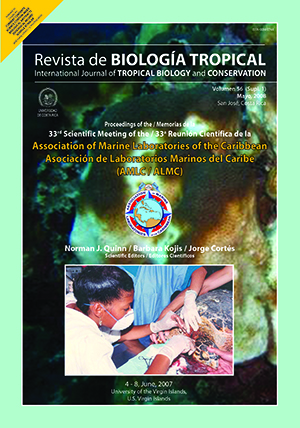Abstract
In 2005, the Atlantic and Gulf Rapid Reef Assessment protocol (AGRRA v. 4) was implemented for the first time in Dominica between October 20 and November 18. During that time elevated sea surface temperatures were initiating the most severe bleaching episode so far recorded for the northeastern and eastern Caribbean. Nineteen of the 20 species of stony corals within the survey were affected. The occurrence of pale, partially bleached or completely bleached colonies exceeded 50% in 13 of these species, and 76 % of all colonies (n = 1475) had some symptom of bleaching. In an effort to assess the impact of this event on Dominica’s stony corals, the sixteen sites studied in 2005 were revisited in 2006 (October 17 – November 25) and resurveyed using the same methods. Twenty of the 23 species within the survey were affected, yet the occurrence of pale, partially bleached or completely bleached colonies exceeded 50% in only four of these species. Twenty-six percent of all colonies (n = 1407) had some symptom of bleaching. However, live coral cover had decreased by 28%, recent mortality had increased by 10%, and the abundance of coral recruits had decreased by 65%. Agaricia agaricites was among the most affected species having been a common coral on Dominica’s reefs until 2005, yet absent in the 2006 survey. Deep sites (6-18m) were more affected by recent coral mortality than shallow sites, undermining the extent to which they may serve as refugia. The 2005 bleaching episode in Dominica followed those of 2003 and 2004. Given the increasingly chronic nature of such events, and the common disturbances of sediment runoff (quarries, coastal development), contamination (solid waste, sewage, pesticides), and fishing (spear fishing, traps, seine nets), Dominica’s marginal reef systems are being exposed to an unprecedented load of stressors. This scenario highlights the urgency of immediate action in reducing local disturbances if the island’s coral reef resources are to have a chance of being conserved.
##plugins.facebook.comentarios##

This work is licensed under a Creative Commons Attribution 4.0 International License.
Copyright (c) 2008 Revista de Biología Tropical






